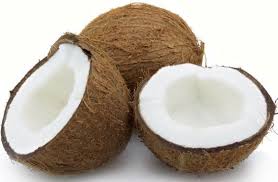记忆方法
将“coconut”分解为两个部分来记忆:“co”可以联想到“coke”,即可乐,而“conut”可以联想到“nut”,即坚果。想象一颗装满可乐的椰子坚果,这样就能记住“coconut”是椰子的意思。
以上内容由AI生成, 仅供参考和借鉴
中文词源
coconut 椰子
来自葡萄牙语。coco, 狰狞的,nut,坚果。因该热带水果剥掉外层皮后,从底部看去如同狰狞的脸而得名。
英语词源
- coconut
-
coconut: [17] Despite its tropical origins, the coconut has a European name. The base of the coconut’s shell, with its three small holes, apparently reminded early Spanish and Portuguese explorers of a human face, so they called it coco; this was the Portuguese word for a grinning or grimacing face, as of a scarecrow. English adopted it in the 16th century, and it formed the basis of the compound coconut, first recorded in 1613. (Before then the fruit of the coconut palm had been known as the Indian nut.)
- coconut (n.)
- 1610s, from coco + nut. Meaning "the head" is slang from 1834.
权威例句
- 1. Coconut milk has little nutritive value.
- 椰子汁没什么营养价值。
- 2. Coconut Rice Balls is a Creole dish.
- 椰丝粉团是一道克里奥尔菜。
- 3. The coconut palm is a native of Malaysia.
- 椰子树原产于马来西亚。
- 4. Coconut is a basic ingredient for many curries.
- 椰子是多种咖喱菜的基本成分。
- 5. He was eating a slice of coconut.
- 他正在吃一片椰肉.

